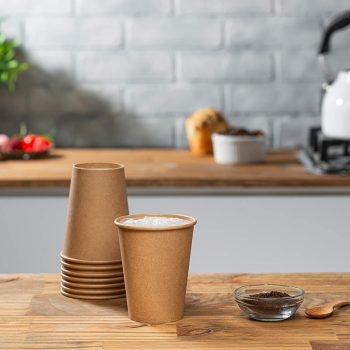Composting paper cups can be an eco-friendly way to dispose of these items, but there are some important facts to consider when it comes to the composting process and the breakdown of paper cups:
- Compostable vs. Biodegradable Cups:
- Not all paper cups are compostable. Compostable cups are specifically designed to break down in composting conditions within a reasonable timeframe. Regular paper cups with plastic or wax linings are not suitable for composting due to these non-compostable materials.
- Composting Conditions:
- Composting requires the right conditions, including proper temperature, moisture, oxygen, and microbial activity. Industrial composting facilities can provide these conditions, ensuring efficient breakdown.
- Certified Compostable Cups:
- Look for certifications like the Biodegradable Products Institute (BPI) certification or other relevant compostability certifications on the cup packaging. This indicates that the cup meets specific standards for compostability.
- Composting Timeframe:
- Certified compostable paper cups can break down within several weeks to a few months in an industrial composting facility, depending on various factors like cup design, material thickness, and composting conditions.
- Home Composting Challenges:
- Composting paper cups at home might be challenging due to the specific conditions required for efficient breakdown. Home compost piles often don’t reach the high temperatures necessary to break down compostable materials quickly.
- Mixed Materials:
- Some compostable cups may have compostable linings or coatings, but other parts like labels or inks may not be compostable. It’s important to know the complete composition of the cup before composting.
- Environmental Impact:
- Composting paper cups can contribute positively to the environment by diverting waste from landfills. When properly composted, they break down into organic matter that enriches soil.
- Compost Use:
- Compost created from compostable cups can be used to improve soil quality and support plant growth in gardens, landscaping, and agriculture.
- Collection Infrastructure:
- Not all areas have access to industrial composting facilities that can handle compostable cups. It’s important to check if your local composting program accepts these cups.
- Disposal Instructions:
- If composting facilities are available, follow the disposal instructions provided by the facility. Properly segregate compostable cups from regular waste and ensure they are deposited in the appropriate collection bins.
- Educational Initiatives:
- Many compostable cup manufacturers provide information about proper disposal and composting. This education helps consumers make informed choices.
In conclusion, composting paper cups can be a sustainable waste management option when using certified compostable cups and disposing of them in facilities equipped to handle compostable materials. However, it’s essential to understand the composting process, check for certifications, and follow local guidelines to ensure that the cups break down efficiently and contribute positively to environmental efforts.





























